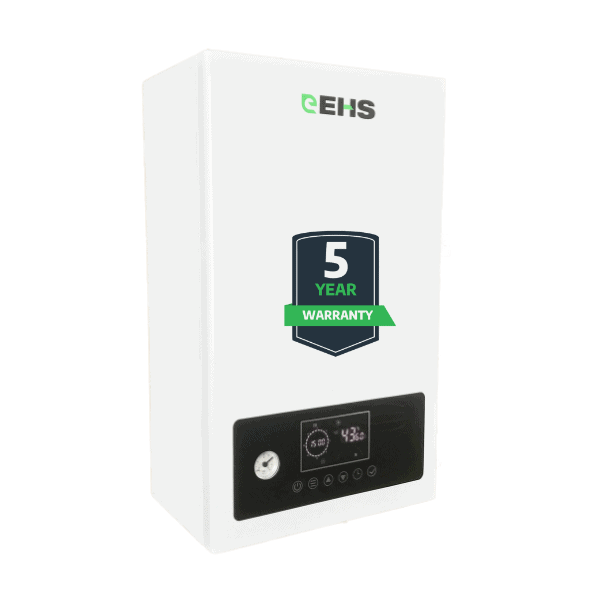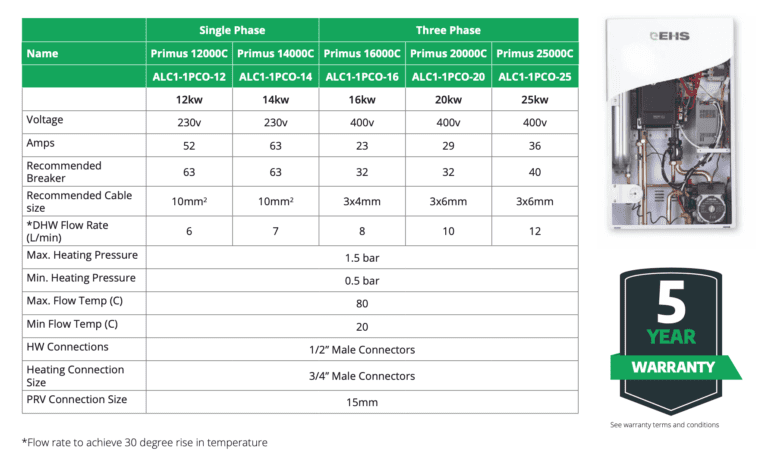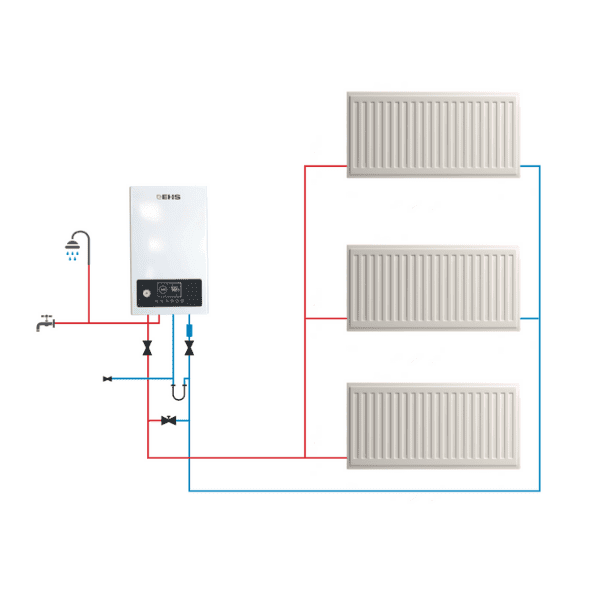- 0345 8628699
- info@ehs-heating.com
- Mon - Fri: 9:00 - 17:00

EHS Electric Combi Boilers
The EHS electric combi boilers will supply all of your hot water and heating needs, just like a gas boiler, but without the installation expense or the need to change your radiators.
Our electric combination boiler is the ideal solution for instant heating and hot water supply requirements in small flats or small homes with one bathroom, where the homeowner requires a cheaper alternative to LPG and oil or the design of the property precludes the use of a gas boiler due to the positioning of a flue. Outputs from 8kw to 24kw ensure most applications are covered.
The boiler internal plumbing is configured to an ‘S’ Plan design and includes a pump and 5-litre pre-plumbed Expansion Vessel for the heating circuit.
Unlike an air source heat pump, the heat from our electric combi boilers is instant, which allows the homeowner to turn the heating, and hot water on and off as requirement dictates. There is no need to change your radiators, and you can have heating and hot water even in the coldest of winters. Electric boilers are also extremely quiet (typically 30db), as the pump is the only moving part.
Benefits of an EHS Electric Boiler?
Easy to install
Almost 100% efficient
No flue required
Compatible with solar
No risk of gas leak
Minimal Repairs
Our Full Range Of Combi Boilers

Electric Boiler Efficiency
The best electric combi boilers are 98~99% efficient, which means that for every 1kW of electricity that goes into your boiler, you will receive almost 1kW of heat out. The boiler however is just one part of the heating system and the whole system must work efficiently for the boiler to achieve 95% or more.
As well as being more efficient than gas boilers, electric boilers are more controllable as the modulating heating elements of the electric boiler provide just the right amount of heat your home requires.
UK homes need just 6-8kW of heat input on a very cold day and even less the rest of the year. To get the most from your boiler, we recommend homeowners start by insulating their property as much as possible. This will reduce heat loss and therefore make it much easier and cheaper to heat and control the temperature within your home. We also recommend the use of smart thermostatic controls, including smart thermostatic radiator valves, in order to control the heating within each area of the home.
How efficient are Gas Boilers?
Currently, the best gas boilers you can buy state they are 92~94% efficient if set up perfectly. If you have an older, average gas boiler, this efficiency drops off significantly (10+years old: 80~85%, 20+years: 75%, 25+ years: 60% efficient).
In order for modern gas boilers to run at their A-rated efficiencies, they need to run at lower temperatures (lower than 65 degrees) which is when a boiler is running in what is called ‘condensing mode. Despite 15 years of condensing boilers, 99% of installers have not been trained to set them up correctly, so most still run at 80 degrees. A 12-month study undertaken by the Energy Saving Trust of boilers in UK households found that A-rated condensing combi boilers were, on average, 83% efficient and heat-only boilers 80.3% efficient. The report concluded that “the in situ performance of the boiler is significantly less than the rated SEDBUK seasonal efficiency”.
What about larger homes with a bath?
For larger homes, where there is high demand for hot water or where there is underfloor heating, we recommend EHS electric system boilers coupled with an unvented cylinder. This will provide good heating for the home and mains pressure hot water in abundance. If you are on a variable electric tariff, this will also allow you to heat all of your hot water when electricity is cheaper late at night.
If you have solar PV panels installed, these are ideal to connect to the hot water cylinder and can supply enough energy in a year to provide up to 70% of your hot water requirements for free.
EHS electric system boilers are designed to eliminate unnecessary external plumbing and pipework. They are the ideal choice for a wet central heating system and underfloor heating systems.
Our single-phase electric system boiler outputs are 6kW and 8kW, with our 3 Phase range available in 18kw, 21kw and 24kw for properties that require larger outputs.
Electric Combi Boiler Schematic

EHS Electric Combi Boiler Features
- Easy to install
- Integrated pump and expansion vessel.
- Zero risk of carbon monoxide emission or gas leak.
- Continuous hot water (flow rates up to 7 l/min on 14.4kw boiler).
- No flue is required.
- Stylish touch screen operation.
- Near silent in operation.
- Minimal moving parts.
- Minimal servicing is required.
- Flexible siting as no flue is required and it’s very compact in size.
- Ideal for flats.
- Ability to use low cost and 100% renewable tariffs.
- Can be used with RF or wifi programmable thermostats.
- Can be integrated with Solar PV systems

At EHS we recognise the growing demand for eco-friendly heating and hot water solutions.
Electric combi boilers can be run from electricity produced from renewable resources such as wind or solar power, which means that you can run your boiler completely free of CO2 emissions.
Moving to electricity is easy, as you don’t need to replace any of your existing pipework or radiators.
By 2050 the UK Government are aiming to generate 100% emission-free electricity. Electric Heating will be a major facilitator in reaching this goal, and in 2020 the Government pledged 40GW of wind-generated electricity in the UK by 2030. This is enough electricity to power every household in the UK!
Electricity prices are currently 3 times more than gas, but as gas is phased out and electricity becomes the fuel of choice, prices per unit of energy are likely to reach parity in the not-too-distant future, and as an electric boiler is 98% efficient, it will be cheaper to run.
By moving to electric heating with a renewable energy tariff, you’ll not only be moving to carbon-free heating but doing your bit for a renewable future!
EHS Electric Boiler Benefits
- Installation is quicker than a gas system
- The wiring of an Electric Boiler is the same as an Electric Shower
- Can be used for Open Vented Systems
- Often used as back-up for Heat Pumps
- Uses standard radiators and valves
- Almost silent when operating
- Emit NO noxious fumes or gases
- EHS Boilers are ideal to be used with underfloor heating systems
Repairs and Servicing
Apart from the pump for the central heating, electric boilers do not have any other moving parts, which makes them easy to service and repair. There is no mandatory service requirement for electric combi boilers as, unlike a conventional gas combi boiler, there is no danger of carbon monoxide or gas leaks. We do, however, recommend that the boiler is serviced at regular intervals, and this should be at a far lower cost when compared to a normal gas boiler service.
Spare parts are available to order from EHS on next-day delivery service.
Advantages Of Electric Combi Boilers
Electric boilers are perfectly suited for homes that don’t have access to the main gas supply. However, they also have a number of advantages over gas boilers that can make them the right choice for homeowners. They are smaller, easier to install, more efficient, quieter and can be set up efficiently utilising off-peak tariffs.
With electricity, you get out what you put in. In other words, they do not need to burn fossil fuels, such as gas or oil to produce heat, and therefore they don’t lose energy through waste gases through flues or chimneys. This results in efficiency rates of 99% compared to 89~ 93% for most modern gas or oil boilers if set up perfectly.
There are over 2 million homes in the UK without access to a mains gas supply, and while many of these homes tend to have an oil boiler, it is expensive and can be difficult to find space for the oil tank. With an electric boiler, you don’t have that problem.
Whether the home is a listed building or under gas boiler restrictions, there are many reasons why it is impractical, unsafe or too expensive to install a gas supply, which means that electric boilers are an important alternative method of providing central heating and hot water.
By using electricity as a fuel, nothing is burnt and therefore there are no waste gases Due to the lack of waste gases, electric boilers do not require a flue, which makes the unit smaller and more compact. In addition, this allows for greater flexibility when it comes to positioning the boiler.
There are very few moving parts in an electric boiler, which not only means that they are quiet, but also means there are very few parts that wear out or need servicing.
Electric boilers don’t burn fossil fuels to generate heat and therefore don’t release waste gases. If you opt for a renewable energy tariff and heat your water when the tariff is at its lowest ( when there is more renewable energy around) you can significantly reduce your carbon footprint, and help balance the grid.
Gas boilers produce harmful gases during operation, which are usually safely expelled out of the flue. However, they can leak carbon monoxide which is harmful to people within the property. With an electric boiler, you don’t have to worry about any harmful gases leaking, which means the need for Gas Safe certificates are eliminated and you do not need to install any CO detectors.
While the price per unit for electricity is 3 times higher than gas currently, however, having an electric boiler can sometimes be more economical if you have an old gas boiler or your property is without a mains gas supply.
The initial costs for an electric boiler are lower as they are simpler and easier to install than gas and oil boilers. In addition, because they don’t need a separate flue or chimney for waste emissions, the installation cost for an electric boiler is often cheaper.
If your property is without a mains gas supply, the cost of having an electric boiler fitted is considerably less than getting gas pipes installed. Electric boilers also don’t require mandatory yearly servicing, which reduces maintenance costs.
There are now many electricity suppliers offering variable tariffs to make use of the lower cost of electricity at night and during less busy periods. If using a cylinder for hot water storage, this is the ideal time to heat your water at a lower cost than normal. Some night time tariffs are as low as 5.6p/kwh.
Over 2 million homes in the UK are without access to a mains gas supply and while many of these homes tend to have an oil boiler, it can be difficult to find space for the oil tank. With an electric boiler, you don’t have that problem.
Whether the home is a listed building or under gas boiler restrictions, such as sleeping areas within a bed-sit, there are many reasons why it is impractical, unsafe or too expensive to install a gas supply, which means that electric boilers are an important method of providing central heating and hot water.
As they contain very few moving parts, electric boilers require very little maintenance. This means that they are very durable pieces of equipment and only require repairs in the unlikely event of a breakdown, rather than consistent upkeep.
Both gas and oil boilers require an annual certificate to ensure they are safe. This must be performed by a professional heating engineer to ensure they are continuing to work efficiently and to avoid breakdowns. These annual services can cost between £50 and £160.
Electric boilers do not require this level of maintenance by law, which can save you money every year. However, if you have a hot water cylinder with your electric boiler you will still be require it to be checked and serviced annually.
If you have a hot water storage tank with an immersion heater you can make use of the free energy generated from your solar panels to heat your water during the day. Of course, you are limited to only using this during the day when the sun is out, but thanks to the storage system, you can enjoy the energy-efficient hot water all day.
Limitations Of Electric Combi Boilers
There are downsides to electric boilers and you need to weigh the advantages and disadvantages before installing an electric boiler and make sure they are right for your circumstances.
Single-phase electric combi boilers have a more limited flow of hot water when compared to a typical gas boiler. This means that larger properties or those with higher levels of hot water usage may be better suited to a three-phase electric boiler (if the property supply allows) or an electric system boiler coupled with an unvented cylinder. This type of system should be able to meet all your heating and hot water demands.
Electricity is more expensive than gas currently, meaning that the running costs of an electric boiler could be higher and your energy bills are likely to go up. However, the UK government is planning to increase electric renewable production by 4 times over the next 8 years which should see prices for electricity come down and gas prices rise, therefore making electricity use more attractive to the homeowner.
Currently, if you’re with a low-cost energy supplier, and you use your electricity wisely (utilising nighttime tariffs to heat your water etc) you will likely pay an average of 9p/kWh electricity compared to 5p for gas. This must be weighed up against the energy efficiency and other benefits of the electric boiler.
It’s very important that before the purchase an electric boiler, your property should be checked to see if it has enough incoming power to supply the boiler. This must be checked by a competent electrician.
Domestic single phase boiler models range from 4kW to 14.4kW. A 14.4kw boiler will draw a current of 63amps and with most properties only having a 100kw supply or less, this can mean that the higher powered boilers are not suitable.
When you consider that then you can see that the bulk of the extra power is for the hot water combi side of the boiler, and therefore you may be better off with a system boiler and cylinder package.
How Do You Size An Electric Combi Boiler?
While most electric boilers are smaller than a gas or oil boiler, it is important to remember that even in the coldest of winters, a property will only need 6~8kw of heating. Boilers are measured in kilowatts (kW), the higher the kW, the more heat and hot water it can provide.
Electric boilers tend to be less powerful than gas and oil boilers, but the higher power of the gas boiler is primarily for making instant hot water and is not used for heating the home. Typically gas combi boilers will have a higher flow rate of hot water (10~15ltrs/min) compared to that of an electric combi boiler (7ltr/min). Where high flow rates are needed, an electric system boiler coupled with an unvented cylinder would be a good choice.
What is cheaper to run gas or electric combi boiler?
At present, the answer is gas. However, the nature of the energy markets will be changing significantly over the next 10 years, with no gas being put into new properties from 2025 and no new gas boilers from 2030. The future will be electric, and the ability to store thermal energy will be key to reducing energy bills in the long term
Electric boilers can be cheaper to run than gas over time if you take into account the lower initial purchase, installation and maintenance costs. Electric heating also has no standing charge or pilot light, so electric combis can save on these costs too.
Combi electric boilers are also suitable for off-grid properties, so electric heating can be a good option for holiday homes or remote rural properties.
